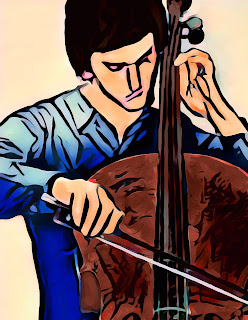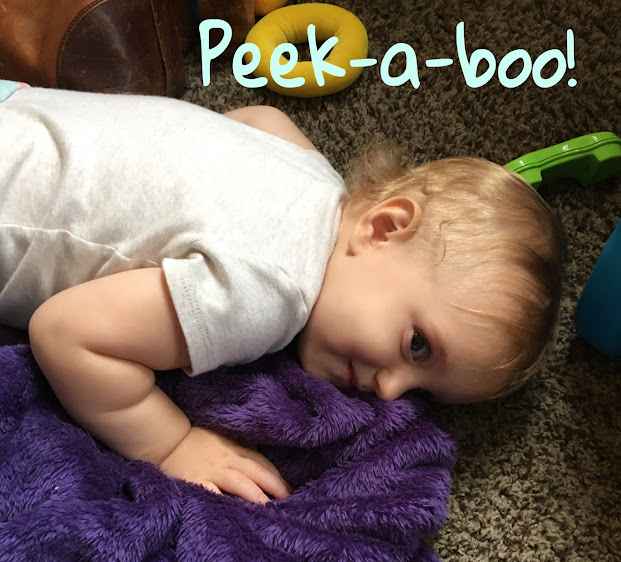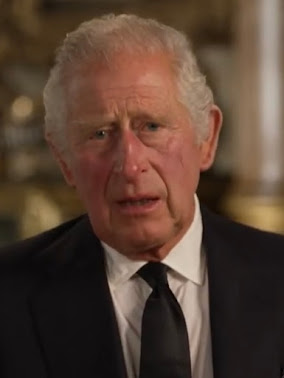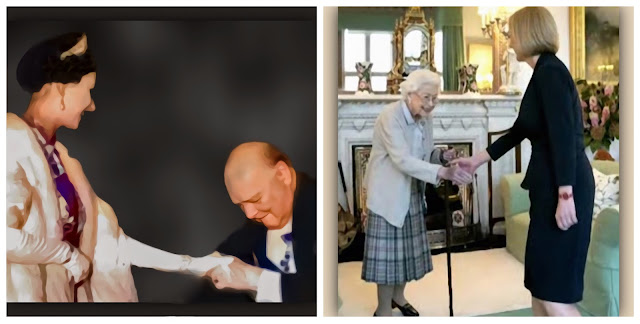An ordinary man engages the circumstances of daily life, seeking to draw closer to the Mystery who gives meaning to everything.
Friday, September 30, 2022
Francis on the Prayer of “Ciao”
Thursday, September 29, 2022
Saint Michael, Help End this Horrible War!
Holy Archangels, pray for us.
Saint Michael, protect us from the wickedness and snares of the devil…
I beg you to protect Ukraine, and help deliver Russia from a tyrannical regime that endangers its own people as well as its neighbors. Help deliver all people in this conflict and throughout the world from the machinations of those in power who think themselves to be "gods" and authorize themselves to crush the dignity of human persons under their feet.
Protect and give courage especially to Russian young men who are now being drafted into the military, that they will refuse to kill their brothers in this unjust, horrible war of aggression.
Holy Archangels, protect our poor world from the scourge of war, and pray for the conversion of every heart to the One who's coming was announced by Saint Gabriel.
Wednesday, September 28, 2022
September 2022: Artistic and Musical “Notes”🎶
Basically, this blog has always been my "Workshop" (primarily for writing, but more recently for photos and digital art as well). Among other things, I have allowed myself the freedom to "tinker around with" many of my interests here, without necessarily polishing up the final form or content of what I wished to express. I have done everything from celebrating saints' days to drafting articles to "thinking out loud." I have pondered the mysteries of faith, the fundamental questions of life, and the interesting things that are happening around me. Sometimes I have tried to think through problems, or just express my struggle with them (which can be therapeutic, if nothing else). Sometimes I have drafted poems (and then gone back to revise them). I will continue to do these things, as well as post cute pictures of our granddaughter every so often (😊). But I may also bring more of my reflections on culture, music, and art as I perceive it "from the inside" - not simply as a critic but also as an artist myself.
In any case, what you get here is me... somewhat unfiltered. I am a proud man, a broken man, desperately trying to hold onto God who is present here and now in my life through Jesus Christ (who "holds me" even when I forget His mercy, and I am forgetful ... most of the time). I am also trying to look at the world and my own various interests objectively, which is to say, according to the glory of Christ who has overcome sin and death, and the Holy Spirit who is at work in my life as a member of Christ’s Body, the Church, and who also works mysteriously in the heart of every human person. I try to find the good wherever it may be stirring to life, even in strange circumstances, and to foster that small flame if possible. In certain instances, I think something good is there, but it is not really there after all. Still, I think it's worth a try.
 This is why I have written from time to time about music and artistic creativity since this blog began. It’s inevitable that the pursuit of “Media Studies” crosses paths with lots of creative people. But that's not the only reason. These interests are personal for me. I empathize with the experience of artists as artists, with their efforts to create works of beauty - even if those efforts are flawed, or mixed up with elements of the vulgarity that is hard for any of us to avoid in this society. Often there is good seed growing amidst many weeds, or (to use another image) real gold hidden in a lot of mud. Sometimes the oddballs and the freaks have their fingers pointing toward important things, and if anyone can accompany them it's me (since I myself am an oddball and a freak who has yet to find a "box" that he fits into).
This is why I have written from time to time about music and artistic creativity since this blog began. It’s inevitable that the pursuit of “Media Studies” crosses paths with lots of creative people. But that's not the only reason. These interests are personal for me. I empathize with the experience of artists as artists, with their efforts to create works of beauty - even if those efforts are flawed, or mixed up with elements of the vulgarity that is hard for any of us to avoid in this society. Often there is good seed growing amidst many weeds, or (to use another image) real gold hidden in a lot of mud. Sometimes the oddballs and the freaks have their fingers pointing toward important things, and if anyone can accompany them it's me (since I myself am an oddball and a freak who has yet to find a "box" that he fits into).I had some talent. Music could have been my life's work, but when I came to that proverbial "fork in the road" I chose the intellectual path, while keeping my creativity alive by writing poetry. (I have a substantial collection of poetry written over the course of more than thirty years; most of it is decidedly third rate, but there may be a few pieces worth passing along.) Pictorial arts were part of my childhood, and I have taken them up again using digital tools, along with photography, in recent years. Here I am still experimenting.
I am rusty with playing my instruments, but I still love music and have not forgotten my education. I love all kinds of music (which is not to say that I think all forms of music are on the same level). Music, fundamentally, is the crafting and arrangement of sounds so that they express an artist's creative intuition in an original, structured, interconnected sonic form. Sound is a mysterious thing. It has its own intrinsic proportions that are rooted in mathematics; the artist usually chooses to build upon these proportions. They are free to choose apparent dissonance in their work, but they better know what they are doing. It's always possible to construct more complex forms and open up new perceptions of beauty. But since music is communicative - since it presupposes the relationship with the listener - it is appropriate that it be accessible to others (unless, of course, a composer is simply "playing with sound" for himself). Thus, music tends to emerge from traditions and styles, which musical artists take up as part of the "material" of their craft, which they reproduce or perhaps develop by marking it with their own original perception and skill.
 Oh my, this musical journey has taken us from Schubert all the way to "Na-na-na-na, na-na-na-na, yeah!" The analogous variety and scope of beauty is as diverse as the differences in the universe of being itself: the differences are not in conflict with one another, but rather in harmony - just as a variety of flowers, shrubs, trees, and plants make up a forest or a garden. The “hierarchy of being” (and beauty) does not negate the unique qualities of different beings. There has never been anyone like Schubert. There is definitely no one like Avril.
Oh my, this musical journey has taken us from Schubert all the way to "Na-na-na-na, na-na-na-na, yeah!" The analogous variety and scope of beauty is as diverse as the differences in the universe of being itself: the differences are not in conflict with one another, but rather in harmony - just as a variety of flowers, shrubs, trees, and plants make up a forest or a garden. The “hierarchy of being” (and beauty) does not negate the unique qualities of different beings. There has never been anyone like Schubert. There is definitely no one like Avril.Sunday, September 25, 2022
Goodbye Summer, Hello Fall!🌴🍁
The weather is beginning to change. Autumn is a mild, lovely, and long season around here. It has just begun, and the leaves are still green but you can feel Autumn’s arrival in the cooler air, and of course in the decrease of daylight hours.
Here are two digital art pictures I call “Goodbye Summer, Hello Fall.”
Saturday, September 24, 2022
Following Jesus Christ Changes the Way We See Reality
For Christians, baptism is the beginning of a new life; it is the event in our own history when Jesus Christ first “takes hold” of us in a decisive encounter with each of us as persons. Baptism unites us concretely with the death and resurrection of Christ, frees us from original sin and previous personal sins, and makes us children of the Father and heirs to the kingdom.
Nevertheless, even after this great, foundational gift of new life in the Spirit, we Christians are still... kind of a mess. It’s all too easy to get “stuck” in this mess, and - even if we don’t abandon our faith and Christian identity - just muddle along, giving little attention to our baptismal vocation, keeping it buried beneath the multitude of distractions that pull us in every direction: our self-image, social status, work, money, ambitions, or whatever else we perceive to be our more immediate preoccupations and more urgent concerns.
Yet the God who gives himself to us in Jesus Christ wants us to “invite him in” to every aspect of our lives. He wants to change our lives.
We must remember Jesus, who is present in our lives now: remember him, stay with him, and open our hearts to the grace that comes to us through our relationship with him, our crucified and risen Lord who wants so much to be with each one of us. He has embraced our entire life on the cross, so that our whole humanity might be healed and transformed. The work of becoming conformed to his total self-giving death-and-resurrection continues throughout our lives, as we "take up our cross" (that life-giving cross) and follow him. Our life of discipleship will face many obstacles, and endure many burdens and hardships, but we must persevere in hope, with confidence that God is good, and that he carries us through it all in his love.
We certainly can't become obsessed with our own ideas and schemes of what is entailed in the "project" of making ourselves perfect. God knows all the particular and inexpressibly peculiar ways we need to be healed and changed. He is our Father, who loves us far more dearly and intimately than we love ourselves. He has given so much, given totally - he has given us his Eternal Son - and he loves us immensely. He wants us to “open up” our freedom and let ourselves be loved by him.Thursday, September 22, 2022
Maria is “On Her Feet”
I think we can officially declare these as “steps”!
Maria is a champion crawler, which is still her preferred way of getting around (although that may change by the time you read this). The other day I was finally able to get a few video clips of her on her feet.
Hooray for Maria!☺️🌟 She’ll be running all over the place before we know it!
There should be a video link below.🙂 See for yourselves:
Wednesday, September 21, 2022
The Vocation of Saint Matthew
This account of Matthew’s conversion and apostolic vocation from Matthew’s own gospel is presented in similar words in Mark 2:14 and Luke 5:27 (except they give “Levi” as his name, but clearly it was the same man). Notwithstanding their brevity, these references to Matthew’s vocation are presented in a way that reveals the depths of his conversion.
The first thing that is clear is that Matthew was a public sinner in the judgment of his own people. He was an official within the complicated and corrupt bureaucracy that the Roman Empire had imposed upon Galilee by means of the “client state” of the tetrarch Herod Antipas. He was a representative of Roman imperial power, and he wielded this power in Capernaum on behalf of a puppet king installed by
this foreign government. He also used it to his own advantage.
Why would anyone in Israel want to be a tax collector? The compensation for being ritually cut off and generally hated by the people was the accumulation of significant wealth. Matthew was officially responsible for providing the government with a fixed sum of money periodically from his region. In order to acquire this sum, however, he was free to set his own tax fees, collecting as much as he could get from the people. The tax collector’s position was virtually defined as the opportunity to practice unlimited graft and extortion. Above and beyond the required government sum and a fair wage for his own efforts, the tax collector used the force at his disposal to rob the population and enrich himself.
Matthew was, in fact, a thief and a criminal.
Then Jesus saw him. Jesus looked at the Mafia boss of Capernaum, who was in his “business office” (so to speak) doing his sordid work of squeezing people for money and keeping records of these “transactions.” A tax collector in Galilee (unlike the fishermen who followed Jesus) would have been literate in both Aramaic and Greek.
Jesus saw Matthew, the person, and loved that person. No doubt he also perceived that after Matthew ceased keeping records of his own extortion racket, he could begin an altogether different sort of record keeping. He could record the words and deeds of the Teacher in writing, and see that they were passed on.
Jesus saw Matthew and spoke to him: “Follow me.” Matthew had probably heard of Jesus from the people, and may have even watched his ministry. Before this moment, however, he had not conceived any hope that his life could be different.
The encounter with Jesus in this moment changed everything.
Matthew’s response was simple but had rich implications. Our text says he “got up” and followed. The Greek term used here, however, is the same word used to express Jesus’s “rising” from the dead. The power of Jesus’s gaze and his words had a miraculous effect, achieving something even more amazing than when he later “raised” Lazarus from the tomb. Jesus “raised” Matthew from the deeper deadness of sin, and invited him to become his companion. So also Jesus looks upon each one of us, and calls us to
do the same.
Tuesday, September 20, 2022
Korea Yesterday and Today: Martyrs, Heroes, and Challenges
On this feast day of the 103 Korean Martyrs canonized by Pope John Paul II in 1984, I want to draw attention to the beautiful ancient land of Korea (and also refer to my column in Magnificat for the month of October 2022). Today is an important day for the Korean Catholic Church, which has a significant and growing presence in Korean society today (in South Korea, Catholics make up 11% of the population).
The Korean peninsula is homeland to a great distinguished people with a united history and culture for more than a millennium. It was Koreans themselves who first acquired the Chinese writings of Jesuit missionary Matteo Ricci, studied them on their own, and then approached priests in Beijing in 1784 and asked to be baptized. These lay people – led by Blessed Paul Yun Ji-chung – began sharing the Gospel with others in Korea, so that by the time the first Catholic priest arrived from Beijing a few years later, there were already 4,000 converts! The new church endured a series of persecutions beginning in 1803, in which thousands of Catholics gave their lives for their faith.
Two groups of Korean martyrs have been documented by name and raised to the honors of the altar. Today we celebrate the group of 103 martyrs from the anti-Catholic persecutions of the middle of the 19th century, including the first native Korean Catholic priest, Saint Andrew Kim Taegon, and a leading lay person, Saint Paul Chong Ha-sang (who was himself the son of one of the original lay Catholics who were martyred in the previous generation). There is also a second group that represents Korea's earliest Christian community: they are 124 martyrs (including Blessed Paul Yun Ji-chung, mentioned above, and Blessed Augustine Jeong Yak-jong, the father of Saint Paul Chong), who were beatified by Pope Francis in 2014.
Korea continues to endure the consequences of their national tragedy in the 20th century, which began with the Japanese conquest and colonization in 1910. On August 8, 1945, the Soviet Union entered the Pacific Theater of World War II with a massive invasion of Manchuria. One and a half million Soviet troops swept down from Siberia into Japanese held territories before the second atomic bomb was dropped on Nagasaki. They entered the northern regions of the Korean peninsula and occupied the area after Japan's surrender, and after agreeing with the United States to "divide" the administration of newly liberated Korea at the 38th parallel (latitude, north of the equator).
There is more about modern Korean history in the article below. While present-day "North Korea" has no Catholic population, the Church has grown remarkably in "South Korea," gaining many contemporary converts who have played important roles in the complex public life in the South. I have written about the conversion of South Korea's first Catholic President, whose full name was Thomas More Kim Dae-jung. The whole story of "D. J. Kim" is a long one, and not lacking in heroism and inspiration in itself.
As always, I only tell the beginning of the story here. During and after my work on this article, I read the entire 1000+ page memoir of D.J. Kim (who died in 2008), which was recently translated with the title Conscience in Action. It is very long, and requires some understanding of the complex history of post-war South Korea. It's not the first book I would recommend to someone who is not already familiar with Korea, its history, and its recent crises. For me, however, reading five years into my still-immersive East Asian Studies Project, D.J. Kim's memoir was a fascinating resource, shedding much light on the significance of Korea today, and allowing me to hear in his own words the dramatic story of the man who has been called "the Asian Nelson Mandela," who was a devout Catholic democratic political activist, prisoner under a repressive South Korean dictatorship, freely elected President at the age of 75, and winner of the Nobel Peace Prize in 2000 for his efforts to draw North Korea into a constructive relationship through prudent and practical interactions. He cannot be blamed for the fact that his efforts did not bear immediate enduring fruit.Korea is historically, ethnically, and linguistically one country, one people. The "demilitarized zone" (DMZ) at more-or-less the 38th parallel remains like a kind of 21st century "Berlin Wall." North of it are Koreans who suffer in poverty under the domination of a reckless totalitarian State, born from Soviet Communism and now a criminal, bizarre, militarized regime with increasingly dangerous nuclear weapons and enigmatic intentions. In the South, Koreans live with democratic institutions and political freedoms, great wealth, information technology and their own multimedia "brand" of pop culture that is influencing the whole world, but also with many facets of a sterile secularism learned from the West.
Korea is a dramatic and important place, sure to be prominent in the future of the 21st century. But more on that another time. Here below is the article on Kim Dae-jung appearing in October 2022 Magnificat.
Monday, September 19, 2022
Happy Janaro Day 2022!😉
Sunday, September 18, 2022
Saturday, September 17, 2022
"The Great River of Mercy"
"Let us allow God to surprise us. He never tires of throwing open the doors of his heart and repeats that he loves us and wants to share his love with us. The Church feels the urgent need to proclaim God’s mercy. Her life is authentic and credible only when she becomes a convincing herald of mercy. She knows that her primary task, especially at a moment full of great hopes and signs of contradiction, is to introduce everyone to the great mystery of God’s mercy by contemplating the face of Christ. The Church is called above all to be a credible witness to mercy, professing it and living it as the core of the revelation of Jesus Christ. From the heart of the Trinity, from the depths of the mystery of God, the great river of mercy wells up and overflows unceasingly. It is a spring that will never run dry, no matter how many people approach it. Every time someone is in need, he or she can approach it, because the mercy of God never ends. The profundity of the mystery surrounding it is as inexhaustible as the richness that springs up from it" (Pope Francis, Misericordiae Vultus 25).
Wednesday, September 14, 2022
“God Greatly Exalted Him”
September 15: The Exaltation of the Holy Cross
“Christ Jesus, though he was in the form of God,
did not regard equality with God something to be grasped.
Rather, he emptied himself,
taking the form of a slave,
coming in human likeness;
and found human in appearance,
he humbled himself,
becoming obedient to death,
even death on a cross.
Because of this, God greatly exalted him
and bestowed on him the name
that is above every name,
that at the name of Jesus
every knee should bend,
of those in heaven and on earth and under the earth,
and every tongue confess that
Jesus Christ is Lord,
to the glory of God the Father.”
Sunday, September 11, 2022
Friday, September 9, 2022
Queen Elizabeth II, Rest in Peace
The British monarchy has had its ups and downs over the course of more than a millennium, to say the least. Its greatest tragedy remains its role five centuries ago in the violent separation of Anglican Christianity from the Catholic Church shepherded by Christ through the Successor of Saint Peter. Ironically, while distancing itself from Christ's sacramental presence in the Catholic Church, the British monarchy preserved (but also to some extent “petrified”) many of the outward forms of monarchical ritual, solemnity, and pageantry from the Middle Ages. It is hard to see much real value in these unique features of the British monarchy except insofar as they remain echoes of the Catholic people who once recognized their significance. Today, of course, the U.K. is a society of many ethnicities and diverse religions. It is also a troubled and divided society. At the same time, the Catholic Church has been undergoing a small but persistent renewal ever since the conversion of the great Saint John Henry Newman in the mid-19th century. We must continue to hope that the monarchy will set itself aright once again, at least regarding its claim to “rule over” (even symbolically) the Anglican communion as England’s official, “national form” of Christianity. A secularized Britian with a monarchy entering into a period of lower profile may create conditions in which this long and necessary process of healing and reconciliation can flourish and grow in new ways. May Jesus and His Holy Mother grant that it be so.
The two pictures below give us a sense of how remarkable and how historically extensive the quiet work of the Queen was during her 70-year reign. As Queen, Elizabeth II was served by no less than 15 Prime Ministers. In the picture on the right, we have the last public photograph of the Queen, who formally received the newest British Prime Minister Liz Truss on September 6 at Balmoral Castle (two days before her death). In the picture on the left, young Queen Elizabeth greets her first Prime Minister in 1952. His name was Winston Churchill.



.JPG)

.jpg)
























